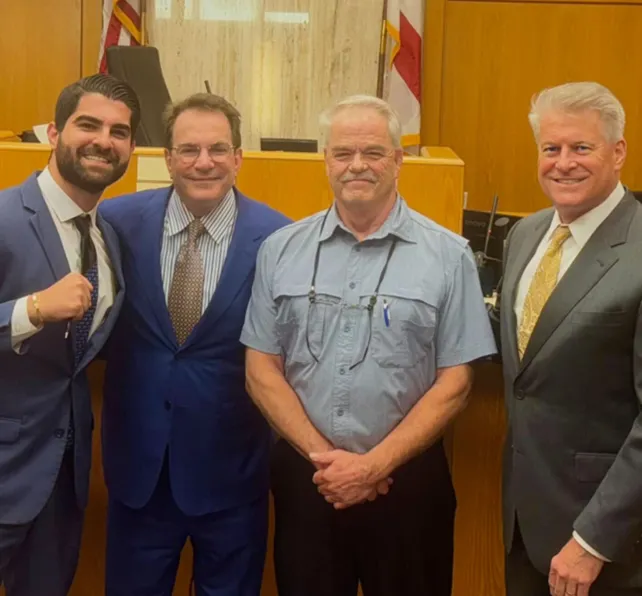Results may vary depending on your particular facts and legal circumstances. The attorney featured above is licensed in Florida. For a full list of attorneys in your state please visit our attorney page.
Fighting for every client from Miami to Jacksonville, because Florida deserves the full strength of America’s Largest Injury Law Firm.
Results may vary depending on your particular facts and legal circumstances. The attorney featured above is licensed in Florida. For a full list of attorneys in your state please visit our attorney page.
Personal Injury Lawyers in Florida
From the Panhandle to the Keys, we’ve built deep roots across the Sunshine State. Our legal team stands with Floridians every day.
Ways We Can Help
From multi-car crashes on I-95 to slip-and-fall injuries at a local business, we have the experience and resources to fight for the compensation you deserve.
Injured in a car accident?
Hurt in a slip and fall?
Injured on the job?
Over 50 Case Types, Like:
View AllSocial Security
Dangerous Drugs
Defective Products
Medical Malpractice
Nursing Home Abuse
Labor & Employment
Truck Accidents
Class Actions
100,000+ Five Star Reviews
The reasons why clients trust Morgan & Morgan.
Based on select nationwide reviews.
Results may vary depending on your particular facts and legal circumstances.
Our Results
Results may vary depending on your particular facts and legal circumstances.
How It Works
Focus on your recovery. We'll take care of the rest.

Submit your free evaluation
Start your claim

Meet your legal team

We fight for more
Results may vary depending on your particular facts and legal circumstances. The attorneys shown in these photos may not be licensed in your state. To find an attorney licensed in your area, please visit our attorney page.
Local Care
Backed by America’s Largest Injury Law Firm.
$25 Billion
Recovered for clients
nationwide700,000+
Clients and families
served1,000+
Attorneys across
the country1
Click may change your life
The attorney featured above is licensed in Florida. For a full list of attorneys in your state please visit our attorney page.
Results may vary depending on your particular facts and legal circumstances.
In the Community
Discover the local Morgan & Morgan experience with news, events, and partnerships.
Learn More
Injured and not sure what to do next? We'll guide you through everything you need to know.
Florida Locations
Get answers to commonly asked questions about our legal services and learn how we may assist you with your case.
What should I do immediately after being injured in an accident in Florida?
If you’re injured in an accident in Florida, acting quickly can make a significant difference in protecting your health and your rights. First and foremost, you should seek immediate medical attention. Even if your injuries seem minor, getting a medical evaluation is crucial. Certain injuries, like concussions or internal trauma, may not show symptoms right away. Documentation of your injuries from a medical professional can also serve as important evidence for a personal injury claim, should you need to pursue legal action.
Next, report the accident by notifying the relevant authorities. If it’s a car accident, call the police. For accidents on a business property, inform the property manager or owner. This ensures the incident is officially recorded, which can help support your case later.
Take photos or videos of the accident scene, your injuries, and any contributing factors (like wet floors or broken equipment). Collect contact information from witnesses, as their statements can provide additional support.
Do not admit fault or make statements about the accident that could be misconstrued. Statements made at the scene can affect the outcome of your claim.
Let your insurance provider know about the accident promptly. However, avoid providing detailed statements without first consulting with a personal injury attorney.
Once you’ve safely left the scene of the accident and have attended to your health, you should contact Morgan & Morgan’s Florida office. Personal injury laws in Florida have specific nuances, including time limitations and shared fault rules. One of Morgan & Morgan’s personal injury lawyers in Florida can help you navigate these and pursue the maximum compensation you deserve. It’s also important to note that Florida follows a comparative negligence rule, so even if you are partially at fault, you may still be eligible for compensation, but it’s important to have legal guidance.
As your personal injury claim moves forward, save all receipts and document expenses related to your injury, such as medical bills, property damage, lost wages, and transportation costs for medical appointments. This will support your claim for compensation.
Adhere to your doctor’s orders for treatment, rehabilitation, or medications. Not following medical recommendations could negatively affect your case.
Following these steps can significantly impact the outcome of your case and help you secure the compensation you need to recover after an accident in Florida. For more information on how to proceed with your personal injury or to learn more about your legal options, contact Morgan & Morgan today for free.
Why choose Morgan & Morgan’s Florida personal injury attorneys?
Our Florida team of experienced attorneys are also local members of the community. They understand how to navigate the complexities of Florida law, and they understand the people of Florida.
They are also backed by the largest personal injury law firm in America, so while you receive personal care from local experienced attorneys, you also get the benefits of Morgan & Morgan’s extensive resources, proven track record, and robust representation.
At Morgan & Morgan, we fight For the People—not the powerful—and in our over 35 years of experience as a family firm, we have recovered over $25 billion for clients, so that they could get the compensation they needed and deserved to move forward with their lives after tragedy struck.
We take personal injury seriously, and we don’t believe you should bear the consequences of someone else’s negligence. Plus, we understand that these accidents can be incredibly challenging, and that’s why we don’t think hiring a lawyer should be.
Hiring a lawyer from Morgan & Morgan is easy, and you can get started in minutes with a free case evaluation.
How do I know if I have a case under Florida law?
If you've been injured due to someone else's negligence, you might be entitled to compensation. We want to ensure that everyone has access to information and the ability to get justice, so you can simply contact Morgan & Morgan for a free case evaluation to learn more about your legal options. Our team can review the details of your situation and advise you on the best course of action.
A Morgan & Morgan attorney will typically confirm that your case meets the following criteria: there was a negligent party at fault and you suffered damages (injuries, expenses, etc.).
How long after an injury in Florida can I file my claim?
The amount of time you have to file a personal injury claim, known as the statute of limitations, varies by state and the specifics of your case. However, some exceptions may apply, such as in cases involving minors, government entities, or when the injury wasn’t discovered right away.
It's important to file your claim as soon as possible to preserve your legal rights. Failing to file within the statute of limitations could result in your case being dismissed, meaning you may lose the opportunity to recover compensation for your injuries.
Since deadlines can vary by state and situation, it's best to consult with a personal injury attorney as soon as possible after the incident to understand the specific timeline for your case. An attorney can help ensure your claim is filed correctly and on time.
How much does it cost to hire a Florida personal injury attorney from Morgan & Morgan?
Morgan & Morgan’s Florida attorneys work on a contingency fee basis, meaning that there are no upfront fees or expenses until your case comes to a successful conclusion. That’s right—the Fee Is Free™, and you only pay if we win.
Our fee is a percentage of the settlement or verdict amount, ensuring we are motivated to achieve the best possible outcome for you.
Do I have to pay for a consultation with a Florida personal injury lawyer?
You don't have to pay for a consultation with Morgan & Morgan. Morgan & Morgan’s Florida personal injury lawyers offer free consultations to evaluate your case. This means you can speak with an attorney about your accident, injuries, and potential claims without any upfront cost. During the consultation, the attorney will review the facts of your case, answer questions, and discuss the possibility of pursuing compensation.
Hiring one of our lawyers is easy, and you can get started in minutes with a free case evaluation on our site or by phone.
What sort of compensation can I recover from a Florida personal injury case?
If you've been injured in Florida, due to someone else's negligence, you may be entitled to various types of compensation through a personal injury claim. The amount and types of compensation you can recover will depend on the specifics of your case, but here are the most common forms of compensation available.
Medical Expenses
You can recover compensation for both current and future medical costs related to your injury. This includes:
- Emergency room visits
- Hospital stays
- Surgeries
- Doctor appointments
- Prescription medications
- Rehabilitation and physical therapy
- Medical equipment (crutches, braces)
Lost Wages
If your injury causes you to miss work, you can seek compensation for the income you lost during your recovery. Additionally, if your injuries are severe and affect your ability to work in the future, you may also be entitled to compensation for lost earning capacity.
Pain and Suffering
Non-economic damages like pain and suffering can be awarded to compensate for the physical and emotional distress caused by the injury. This type of compensation accounts for:
- Physical pain
- Emotional trauma (anxiety, depression)
- Reduced quality of life (inability to enjoy activities you once did)
Property Damage
If your personal property, such as a vehicle, was damaged in the accident, you could recover compensation to repair or replace it.
Loss of Consortium
If your injuries have negatively affected your relationship with your spouse, such as a loss of companionship or intimacy, your spouse may be able to seek damages for loss of consortium.
Permanent Disability or Disfigurement
In cases where the injury results in long-term or permanent disabilities, you can seek compensation for future medical needs, adaptive equipment, or alterations to your home to accommodate your condition. If disfigurement is involved, such as scars or the loss of a limb, additional compensation may be awarded.
Punitive Damages
In rare cases, where the at-fault party acted with extreme negligence or intentional misconduct, the court may award punitive damages. These are meant to punish the wrongdoer and deter similar behavior in the future.
Wrongful Death
If a loved one died due to the accident, family members can file a wrongful death claim to recover compensation for funeral expenses, medical bills, loss of future income, and loss of companionship.
Other Related Expenses
You may also recover other expenses related to your injury, such as transportation costs for medical appointments, home modifications needed to accommodate a disability, and costs for assistive devices like wheelchairs.
Every case is unique, and the specific compensation you may recover will depend on the circumstances of your injury and the extent of your damages. At Morgan & Morgan, our experienced attorneys will thoroughly assess your case and fight to ensure you receive the full compensation you deserve.
Who will be on my Florida case team?
When you hire Morgan & Morgan, you don’t just hire a lawyer, you hire the largest personal injury law firm in the country with an army of over 1,000 lawyers and offices in all 50 states and Washington, D.C.
Your case will be handled by a dedicated team of professionals, including personal injury lawyers, paralegals, and support staff. You will be assigned a care team that includes a primary attorney who will oversee your case and ensure you receive personalized attention throughout the process.
When do I meet with my Florida lawyer?
After your initial consultation, your care team will schedule regular meetings to discuss your case, provide updates, and prepare you for any upcoming proceedings. We are committed to maintaining open lines of communication and keeping you informed every step of the way.
These meetings can be handled in person, virtually, and by phone, depending on your case’s requirements and your ability to do so.
Do you have attorneys in Florida who speak multiple languages?
Yes, Morgan & Morgan has a diverse team of attorneys who speak multiple languages, including Spanish. We strive to ensure that language barriers do not prevent you from receiving the legal representation you deserve.
What happens after I submit my personal injury claim in Florida?
Once you submit your claim, our team will begin a thorough investigation, gather evidence, and build a strong case on your behalf. We will keep you informed of our progress and work diligently to secure the best possible outcome for you. If a fair settlement cannot be reached, we are prepared to take your case to trial.
For more information or to get a free case evaluation, contact Morgan & Morgan’s Florida office today. We are here to help you navigate the legal process and fight for the justice and compensation you deserve.
Will my personal injury case in Florida go to trial or settle out of court?
Many personal injury cases are resolved through settlements before reaching trial. Settling out of court can be a quicker, less stressful, and more cost-effective way to resolve a case depending on the facts of the case.
However, whether your case will settle or go to trial depends on several factors, including the strength of the evidence, the willingness of the other party to negotiate, and your own preferences. At Morgan & Morgan, we prepare every case as if it will go to trial to ensure we are ready to fight for the maximum compensation possible. If a fair settlement cannot be reached, our attorneys are fully prepared to take your case to court.
How long does a personal injury lawsuit in Florida take to resolve?
The duration of a personal injury lawsuit varies depending on the complexity of the case, the severity of the injuries, and the willingness of the parties to reach a settlement. Some cases may be resolved in a matter of months, while others can take years, especially if they go to trial.
At Morgan & Morgan, our attorneys work diligently to move your case forward as efficiently as possible while ensuring no corners are cut. We will provide you with an estimated timeline based on the specifics of your case and keep you informed of any changes. To learn more, get a free case evaluation today.
How often will I receive updates about my case in Florida?
At Morgan & Morgan, we understand the importance of staying informed about your case. We are committed to maintaining open lines of communication with our clients. You can expect regular updates about the status of your case, including any new developments or offers of settlement.
Additionally, if you have any questions or concerns at any time, our attorneys and support staff are available to provide answers and reassurance. We believe that keeping you in the loop is a crucial part of providing the best legal representation possible.
¿Usted tiene preguntas acerca de su caso en español?
Los abogados de lesiones personales de Morgan & Morgan entendemos lo importante que es resolver todas sus preguntas legales en el idioma en el que usted pueda entender mejor. Por eso contamos con una sección de Preguntas Frecuentes en nuestra página de abogados.com. Recuerde que en caso de ser victima de un accidente y necesitar ayuda legal, usted cuenta con los abogados de Morgan & Morgan. Siendo el bufete de abogados de lesiones personales más grande de los Estados Unidos, contamos con los recursos y la experiencia que usted necesita para defender sus derechos. ¡La justicia es derecho de todos!




























